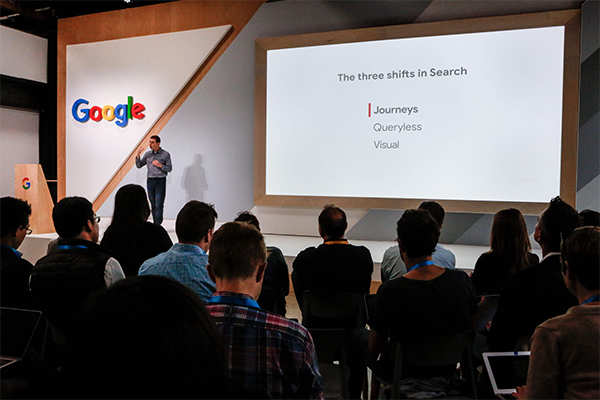Google unveiled changes Monday aimed at making the leading search engine more visual and intuitive to the point that it can answer questions before being asked.
Artificial intelligence and
machine learning are core drivers of how Google will pursue its mission to organize the world's information and make it accessible to anyone, search vice president
Ben Gomes said at an event in San Francisco.
The search engine focused strongly on mobile use and appeared to be growing more like Facebook, encouraging users to linger and explore topics, interests or stories with growing emphasis on photos and videos. Results will be increasingly personalised.
"Search is not perfect, and we are under no illusions it is," Gomes said.
"But, you have our commitment that we will make it better every day."
He described the latest changes as shifting from answers to journeys, providing ways to target queries without knowing what words to use and enhancing image-based searches.
Google Images was redesigned to weave in "Lens" technology that enables queries based on what is pointed out in pictures.
The Images overhaul includes carousels of online video clip highlights displayed with mobile search query results.
New
Activity Cards will let users pick up searches where they left off, eliminating the need to retrace online steps.
The search engine will also let users create Collections of online content, and suggest related material that might be of interest.
A Google feed used by more than 800 million people monthly is getting a new name, Discover, and increased ability to offer people relevant information they are likely to want but haven't thought to ask for yet.
The feature was described as "
Google search helping you discover new things without a query."

Google said it is also testing out an improvement to its job-related search results that will figure out what skills are needed for such posts and information about how to acquire them.
"Information and language are core to what we are as human beings," Gomes said.
"Our work here is never done."
Since being launched 20 years ago, Google has grown from simply a better way to explore the
internet to an online tool so woven into daily life that its name has become a verb.
Early days of search were about software matching keywords or precise phrases to content on web pages, with typos or imprecise queries destined to fail.
Google has consistently refined its search algorithm, which it keeps secret, and uses AI to understand what people are looking for online and to tailor results based on what it knows about users individually and collectively.
Google's rise put it in the crosshairs of regulators, especially in Europe, due to concerns it may be abusing its domination of online search and advertising as well as Android smartphone operating software.

There have been concerns that parent company Alphabet is more interested in making money from people's data than in safeguarding their privacy.
Google was under fire anew from privacy advocates for a change that automatically signs users into Chrome browsers on desktop computers when they sign into any of the company's other services such as
Gmail or search.
Chrome search data is not in sync with Google servers unless that function is enabled, the company said in an update to its policies.
Google is among the tech companies being called upon to better guard against the spread of misinformation - and has also been a target of US President Donald Trump, who added his voice to a chorus of Republicans who contend conservative viewpoints are downplayed in search results.
Google's anniversary also comes with the rising trend of people engaging with the internet through voice-commanded digital assistants, including one backed by the Silicon Valley giant.
Seattle-based Amazon last week sought to make its Alexa digital assistant and online services a bigger part of people's lives with an array of new products and partnerships.











